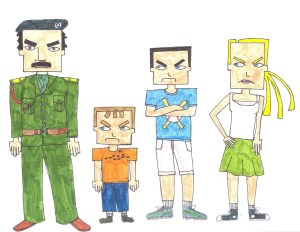I’m explaining barbed wire to Jack, who is six.
We’re driving in Detroit after dropping Alani off at theater practice.
Jack opted to go with us rather than with his mom to Michael’s soccer game. Of the five of us in this house, Jack is the most likely to disregard the two-tribe stepfamily divide. Out of habit, Rachel would generally take Jack, and I would take my daughter to theater practice. I decided to shake things up, and invited Jack to come with Alani and I. Jack considered, questioning his mom closely about the playground equipment at the soccer field, before casting his lot with Alani and I.
We drive through a decrepit part of Detroit after dropping Alani off, past lots fenced with barbed wire. Jack asks why they have barbed wire. I tell him to keep out people who might steal something.
“Then why don’t we have barbed wire around our house?” he asks.
We live in a tidy, tiny suburb. I tell Jack it’s because we have a police station right at the end of the corner. We drive, and Jack continues to survey the desolate landscape.
“Mike,” he says, “Is there a lot of barbed wire in Detroit?”
“Yes.”
“How come?”
“Because they don’t have enough police to protect everything,” I say.
Jack moves on to related crime topics.
“How do guns kill people?” he asks.
“With bullets,” I say. I explain that bullets are hard pieces of metal that go into a person’s body and wreck something important, like their heart.
“And then they die?”
“Sometimes.”
He accepts the authority of my answers until he asks if bullets can go through teeth, and I say they can. He disagrees, insisting that teeth are the strongest part of the body, stronger than bones, so there is no way that a bullet can break them.
“A bullet can knock teeth out,” Jack says, “but it’ can’t go through them.”
I admit that he may be right, and take the ramp onto I-75 north. Jack asks what we’re going to do now. I tell him we’ll go home, that I have some work to do. This disappoints him. He’d hoped for more adventure.
“I should have gone with my mom,” Jack says.
“Or, ” I say, “we could go to the library.” I refuse to have my small victory over the two-tribe divide sullied by buyer’s remorse.
Jack perks up. He wants to know which library, the good one or the boring one. I tell him the good library, with the kids’ books and the wishing fountain outside.
We park outside the library and approach the fountain. Seven years ago, when Alani was Jack’s age, she stood by the same fountain and asked how long it took for wishes to come true. I said it depended on the wish. Alani told me that she’d wished many times to become a polar bear, but she never did become one.
I hand Jack a penny. When we reach the fountain we see that it’s been drained. Only a thin puddle of water remains. Not much more than a damp spot.
“Oh, no!” Jack says.
I assure him that if the penny gets wet, the wish counts. Jack tosses his, and it plinks into the puddle.
“Good throw,” I say.
Jack takes my hand. We walk toward the library.
“Mike,” he says, “My wishes never come true.”
“Keep wishing,” I say. “They will.”
Read Full Post »

 Tuesday night I tell Jack to sit on the toilet. He refuses. I tell him he has to sit down, or he can’t go back in the basement t.v. room with Alani and Michael. Jack makes a run for the basement doorway. I intercept him, blocking the stairwell.
Tuesday night I tell Jack to sit on the toilet. He refuses. I tell him he has to sit down, or he can’t go back in the basement t.v. room with Alani and Michael. Jack makes a run for the basement doorway. I intercept him, blocking the stairwell.